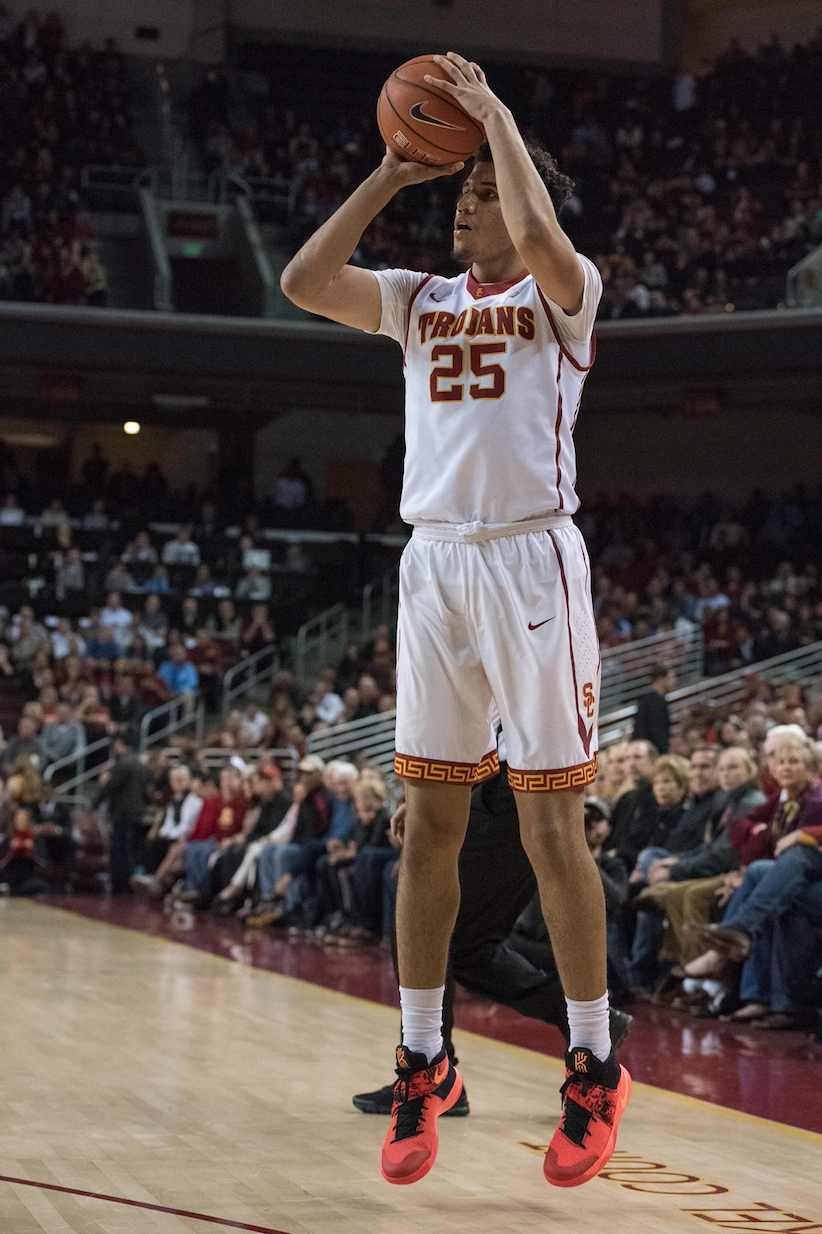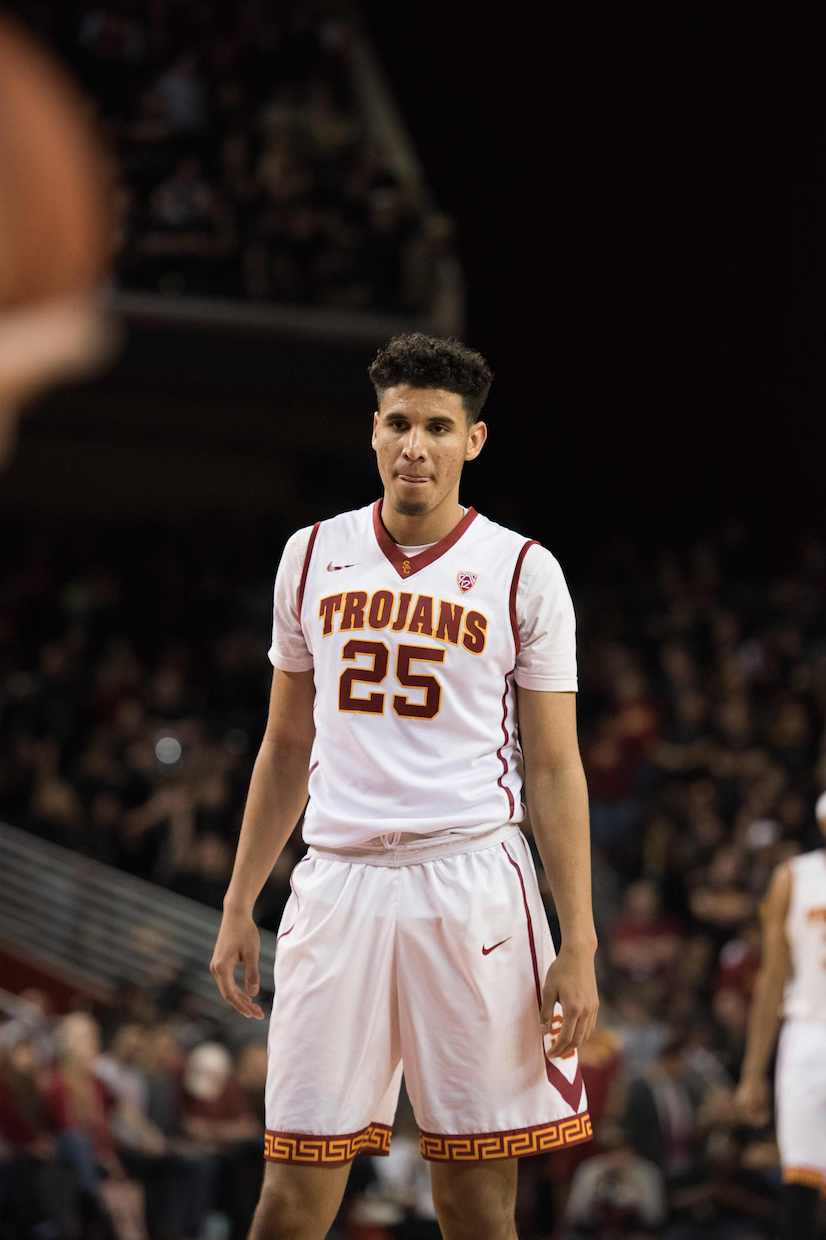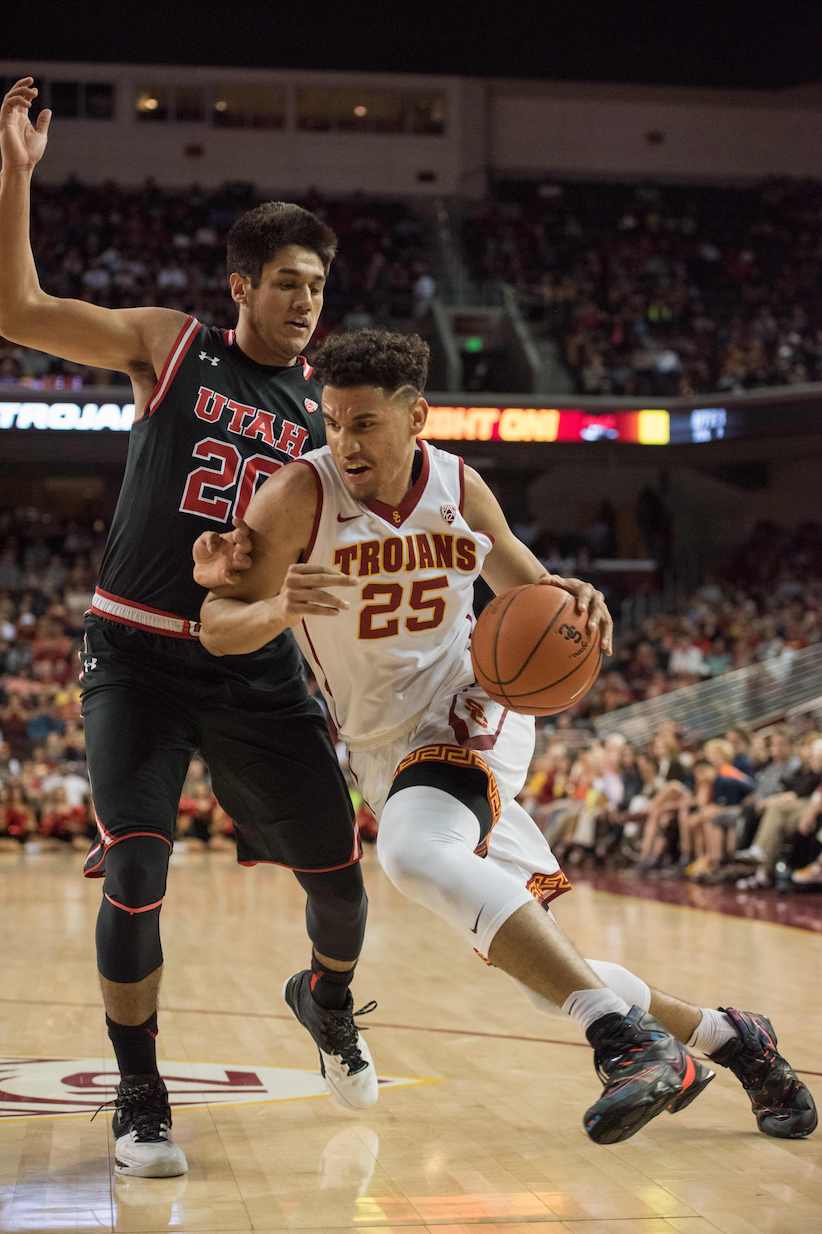Just keep shootin’: Bennie Boatwright’s work ethic and patience have him primed for success

Bennie Boatwright takes a jump shot during a game. After two injury-riddled seasons, the captain is back to prove himself in his final season as a Trojan. (Tal Volk | Daily Trojan)
Bennie Boatwright has never turned down a workout.
Even now, as a senior, the men’s basketball captain will prove to his father, Bennie Boatwright Sr., that he is working out — even late on a Friday.
“It’s a Friday night. Everybody’s out doing their thing,” Bennie Sr. will say.
“Dad, you don’t think I’m lying?” Boatwright will respond, with a picture of the gym where he is working out.
Boatwright’s efforts are indicators of a work ethic that he has exhibited since childhood, one that he continues to carry as he enters the final season of his college career, hoping to rebound from a serious knee injury that has kept him from game action since February.
The injury relegated him to watching from the bench last season as the Trojans were fleeced of a spot in March Madness before bowing out early in the NIT Tournament. It also denied him the chance to declare for the NBA Draft.
“[NBA teams] are going to question your durability,” he said. “I want to come back … and have a healthy season.”
Boatwright is itching to be back, to lead his team as the veteran most likely to be drafted next summer.
“I haven’t played in so long. I go back and watch my own film to remind myself how I played,” Boatwright said. “It got to that point.”
When healthy, Boatwright was one of 50 college players named to the preseason Naismith Trophy watchlist for the nation’s top player. He is the type of athlete today’s NBA coaches drool over. He is 6-foot-10 with range, a solid 3-point shot, the ability to put the ball on the floor and a much-improved defender from his freshman year.
“If he has a good senior year, he’ll be a first round pick easily,” Bennie Sr. said.
But to head coach Andy Enfield, the NBA is not the focus — “We don’t even discuss the NBA.”
Instead the discussion is focused on Nov. 6: the night USC opens its season against Robert Morris at Galen Center. For Enfield, Boatwright needs to get his timing back, needs to play in a game before any discussion about the future.

Senior captain Bennie Boatwright has missed 26 games over the last two seasons due to injury and will be a gametime decision Tuesday. (Daily Trojan file photo)
Work ethic
Boatwright grew up in Mission Hills, just 50 miles north of USC. His father, now retired, was a cop working at the Los Angeles Police Department for 34 years.
Boatwright would work around Bennie Sr.’s schedule to get shots in, whether that was 6 a.m. at the park, 2 a.m. at the police academy’s court or at midnight in the family’s backyard — neighbors be damned.
“They started calling the police on us,” Boatwright said. “So we had to stop [shooting] super late.”
But he still shot, and shot a lot – 500 to 1,000 times a day. Form shots, one-dribble pull-up jumpers, holding the follow through. Again and again and again.
“You’re not going to shoot three times a week,” Bennie Sr. said, “and expect to be good.”
Marcus Lovett, who trained Boatwright from when he was just nine years old, said Boatwright’s worth ethic from an early age allowed him to be pushed to the limit.
“I’ve never had Bennie object to anything since I’ve ever known him,” Lovett said.
There’s also the physical aspect: the part that nobody can teach.
When Lovett first met him, Boatwright was already bigger, faster and better than the rest of the kids. By his teenage years, Boatwright was 5-foot-11. For Lovett, Boatwright was a can’t-miss prospect.
“When you get to the pros, they’ll teach you the other stuff,” Lovett said. “Your height, which you can’t teach, and that stroke – you either have it or you don’t.”
Alex Parker, who became on of Boatwright’s mentors as a child, also worked with current NBA veteran Trevor Ariza.
“I just could tell by [Boatwright’s] body movement he was going to be special,” Parker said. “He had a natural touch.”
Choosing USC
Boatwright starred at Village Christian High School and had a fair number of offers from big-time colleges: Arizona, UCLAand Kansas, just to name a few.
And then there was USC: a then-fledgling program in Enfield’s first season as head coach.
“Bennie took a chance to come to a program where he thought the players that came in together could make a difference, and he certainly has,” Enfield said.
Enfield landed what turned out to be a stellar recruiting class – Boatwright, along with Jordan McLaughlin, Elijah Stewart and Chimezie Metu, a quartet that led USC to two straight NCAA tournament appearances.
Associate headcoach Jason Hart, who played a crucial role in recruiting Boatwright, said he knew Boatwright wanted to stay close to family in Los Angeles. He kept in touch with Boatwright through high school, and made a case that the forward could come in to USC and play right away.
“He could’ve easily went to UCLA,” Hart said. “We just built a better relationship with him and he felt comfortable over here.”

Boatwright drives to the basket in a game against Utah. (Daily Trojan file photo)
Boatwright said he was drawn in by Hart’s honesty. He “kept it real” and never promised anything.
“At the time, we were a bad basketball program,” Hart said. “The pitch was you can come here, create your own legacy, create your own mark.”
Boatwright also wanted to build a program from the ground up as opposed to joining an already-established team. The forward has started all three seasons — an opportunity he likely would not have gotten at UCLA or Kansas.
“That’s a lot more pleasing than going to a program that’s already at the top,” Boatwright said. “It feels good to build it from the bottom. I enjoy the challenge.”
Building the Program
When Boatwright first arrived at USC, he wanted to just launch jumpers.
“Just coming in and being all about scoring, scoring, scoring,” he said. “That was the only thing I wanted to do: score.”
But before his sophomore year, he was elected team captain. And he knew there had to be a change in his mentality.
“Coming in next year, trying to win,” he said emphatically, “Trying to win, win, win.”
McLaughlin, who is now in the G-League after four years running the point at USC, said Boatwright’s mindset isn’t uncommon among younger players.
“When you come into a new spot, you’re one of top players on your high school team,” he said. “I think he really learned that when he got with us that everybody is just as good as you.”
Boatwright learned under Enfield’s system that the team’s tactics revolved around sharing the basketball and being multidimensional, a now-proven strategy with USC leading the Pac-12 in assists last season.
“It’s important in our system and philosophy to share the basketball, to make the extra pass, create for your teammates,” Enfield said. “Bennie has done a good job of elevating his game where he can not only shoot the perimeter jump shot but put the ball on the floor. He can post up and get to the foul line.”
Along with his on-court skill, Boatwright has become more mature. Hart said that Boatwright used to become irritated easily.
“Now he knows. He’s mature enough that it’s not personal,” Hart said. “He’s accepted coaches and understands defenses as well now.”
Leadership
When asked if he could recall the moment he knew he was good at basketball, Boatwright’s confidence emerged.
“I feel like I’m better than anybody I play against,” he said.
It’s a side of the usually reserved Boatwright that comes through when he’s on the hardwood.
“Bennie’s super cool, super laid back — except when he’s on the court,” said junior guard and fellow captain Jonah Mathews. “When’s he on the court, he’s super serious.”
The only thing that has kept Boatwright from reaching his full potential has been injuries.
Boatwright has had recurring knee problems; he missed 17 games his sophomore season and the final nine games of last season. But that hasn’t stopped him from being a leader, according to his teammates.
“He helps some of our younger guys,” said redshirt junior guard Derryck Thornton. “When they’re doing something wrong, he pulls them aside and shows them the ropes.”
Redshirt senior guard Shaqquan Aaron added that Boatwright doesn’t act like he’s injured, still getting shots up and working out.
“That makes other guys, if they were to get hurt, be like man, ‘I see Bennie hurt shooting jumpers, so I’m going to do the same thing,’” Aaron said.
Case in point: during a intrasquad scrimmage in October in front of donors at the Galen Center practice court, Boatwright took advantage of every timeout to get up shots. Dressed in a full uniform despite not participating in the scrimmage, he conversed with donors, showing them his injured left knee.
He looked like he badly wanted to play, like he didn’t want to be confined to the bench.
But the recovery is all part of the process, as Bennie Sr. calls it — a process filled with repetition, of not letting the negatives get to you and of being consistent. These are values Bennie Sr. learned from over three decades in LAPD, ones that he has now passed on to his son.
“When he was born,” Bennie Sr. said, “the process started.”
The process took Boatwright through early morning and late night workouts as a kid, a stellar high school career and a scholarship at USC. Now, the process is at a crossroads, the biggest of his career to date.
The NBA is on the other side, but first, he has to prove his health and his worth on the court. His status for the home opener on Tuesday is still up in the air.
“It’s going to be close,” Enfield said last week.
With his injury, Boatwright has spent a lot of time on his own the last eight months.
It’s been therapeutic for him ever since he’s gotten over the initial shock of the injury. He’s become more patient, learning more about himself and not planning on returning to the court until he feels 100 percent.
“I’m appreciative of that,” Boatwright said. “Of course, I am dying to get on the court. I really do want to get on the court.”
